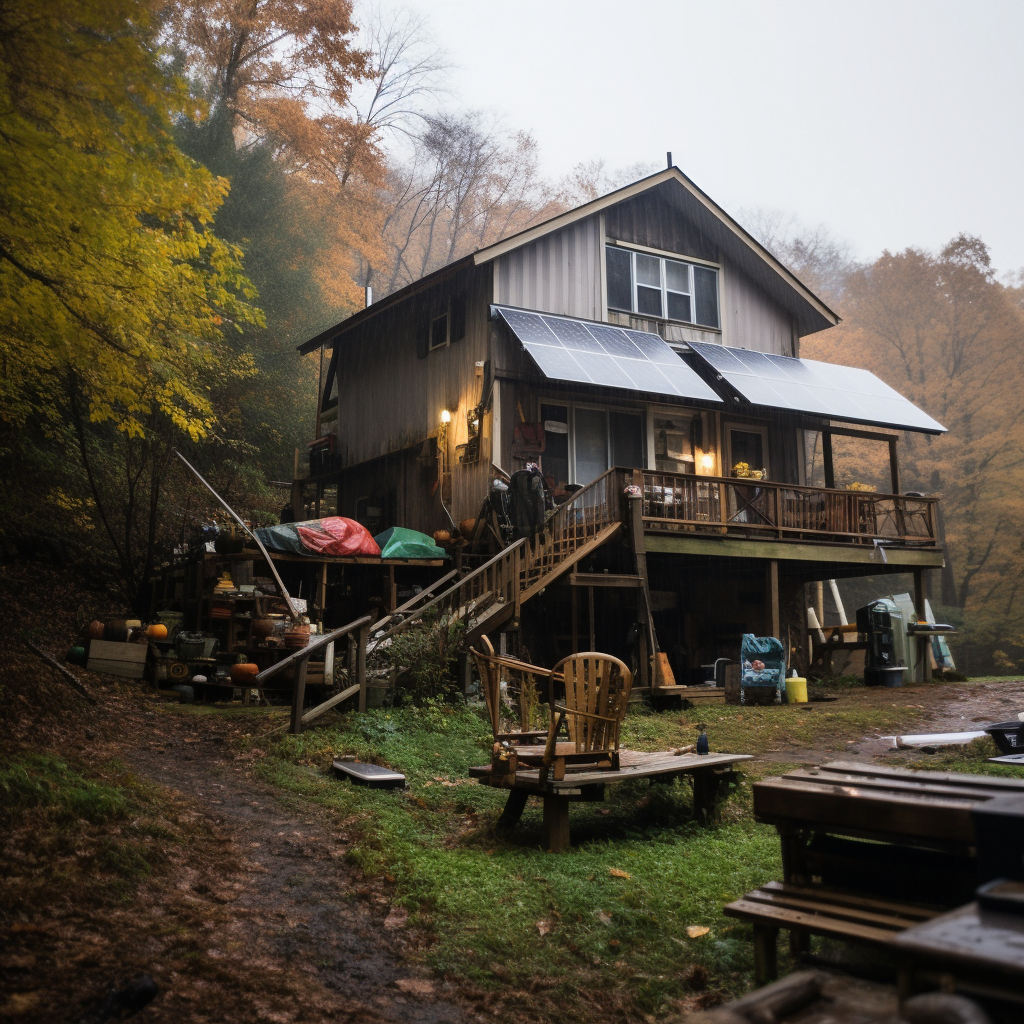The Concept of Being Off the Grid
Living off the grid means not depending on public utilities such as electricity, water, and sewage. It’s a lifestyle seeking simplicity and sustainability. To do this, people generate power through renewable sources like solar or wind turbines. They also manage resources by using rainwater harvesting, composting toilets, and organic farming practices.
Off-grid living encourages connection with nature and a minimalist approach to consumption. People focus on self-reliance, sustainability, and harmony with their surroundings.
Did you know? The American Solar Energy Society reports that in the US alone, there are around 200,000 off-grid households! Who needs neighbors when you can have all the wildlife drama and unpredictable weather with off-the-grid living?
Common Reasons for Choosing Off-the-Grid Living
Living off the grid has become popular for many reasons. It’s good for the environment, self-sufficient, and offers financial independence. Plus, it also connects people with nature and allows for a simpler life.
Additionally, it increases resilience during events like power outages or disasters. It gives peace of mind and security.
This lifestyle has a long history, as our ancestors lived off the land. Nowadays, there’s a desire to reconnect with simpler times. Though, it can be hard to find Wi-Fi in the middle of nowhere! Praying to the technology gods for a hotspot may be necessary.
Challenges and Considerations of Living Off the Grid
Going off the grid brings lots of challenges and considerations. It’s important to know them. Here’s what to think about:
- Energy Independence: Solar panels and wind turbines are the way to go. It requires careful planning and investment.
- Water Management: Find a sustainable source, use it carefully, store and filter it.
- Waste Disposal: Compost, recycle, and properly dispose of waste without relying on municipal systems.
- Self-Sufficiency: Learn farming, food preservation, and medical skills, so you don’t need anyone else.
- Social Isolation: It’s hard to maintain relationships and find community support when living off the grid.
Adapt to weather, embrace minimalism and mindfulness, and prepare for a sense of freedom and autonomy.
Living off the grid has a long history. From remote tribes to modern pioneers, it’s always been around in some form. Now more than ever, it’s a way to rebel against the norm.
Success Stories: Examples of Off-Grid Lifestyles
Success stories of individuals living off the grid show inspiring examples of alternative lifestyles. These folks have disconnected from regular power sources and chosen self-sufficiency. Let’s explore these fascinating stories and the unique details that make them truly extraordinary.
| Success Story | Location | Sustainable Practices |
|---|---|---|
| Jane | Rural Montana | Solar panels, rainwater collection, organic gardening |
| Mark | Off-Grid Cabin | Wind turbine, composting toilet, off-grid solar system |
| Lisa | Tiny House | Renewable energy, water conservation, sustainable materials |
Jane in rural Montana uses solar panels and collects rainwater for home use. She also practices organic gardening to give her family food.
Mark’s cabin is powered by a wind turbine and an off-grid solar system. He also uses a composting toilet to recycle waste.
Lisa’s tiny house is efficient and sustainable. She relies on renewable energy sources like solar power & conserves water. Plus, she uses sustainable materials to reduce her environmental impact.
To adopt an off-grid lifestyle successfully:
- Invest in renewable energy sources like solar panels or wind turbines to generate your own electricity & reduce reliance on outside power grids.
- Set up rainwater harvesting systems to collect & store water for daily use, reducing dependence on municipal supplies.
- Embrace sustainable building practices by using eco-friendly materials like reclaimed wood & recycled insulation to construct your living space.
- Practice water conservation techniques such as low-flow fixtures & graywater recycling to conserve this precious resource.
- Explore natural waste management methods like composting toilets that turn waste into valuable fertilizer for plants.
By following these suggestions, you can lessen your ecological footprint & gain self-reliance & resilience in an uncertain world. Off-grid living allows for a more sustainable lifestyle, while fostering a deeper connection to nature & a sense of personal fulfillment.
Living off the grid may not be for everyone, but hey, at least no one will interrupt your Netflix binge with a power outage!
Future Outlook: Is Off-the-Grid Living Feasible for Everyone?
Off-the-grid living has always been a fascinating concept for the future. Is it actually possible for everyone? The answer isn’t clear-cut.
Living off the grid means relying on other energy sources instead of the traditional power grid. It may sound great, yet there are things to consider. Location is key. You need access to natural resources like sunlight and running water. This isn’t realistic in crowded cities.
Plus, there are high upfront costs for setting up and keeping up renewable energy systems. This could be a big problem if you don’t have much money. Technology and infrastructure are also challenges. Developing reliable off-grid systems needs constant improvements.
It’s worth noting that off-the-grid living isn’t an extreme idea. Even those who can’t fully disconnect can still use solar panels or rainwater harvesting. Start small – reduce energy consumption and practice water-saving. This will show your commitment without drastic changes.




